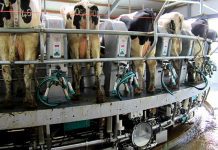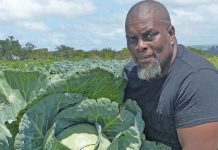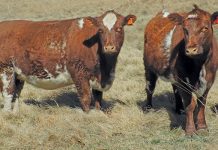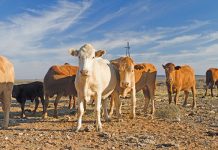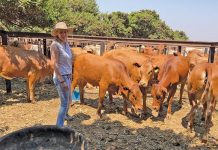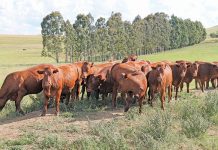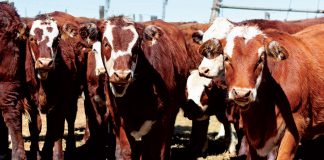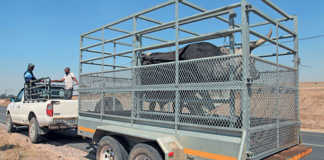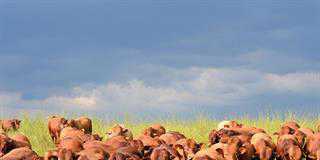Nico Olivier, the owner of the Nicelle Red Angus stud in the Western Cape, is gaining huge success in the international cattle market through the export and import of Red Angus semen and embryos. He started in 2004 when he entered into a joint venture with one of Paraguay’s most renowned cattle breeders, Isabelle C ouchonal, through an introduction by Embryo Plus. Isabelle, also known as Mrs Red Angus, has around 500 Bonsmara and Red Angus cattle in her main stud, which is run on a 2 900ha ranch 250km from Asunción. Her commercial herds, totalling over 5 000 animals, are kept on other ranches in Chaco, the main cattle-producing area in Paraguay.
Mutual benefits
The partnership entailed the establishment in Paraguay of a jointly-owned Red Angus stud, called Angus Africa. Nico was attracted by the low cost of production in Paraguay, the genetic advantages that the new herd would yield, and the fact that he would be able to share genetic material without depleting the genetic base of his own stud. The partnership also offered new market possibilities, as he would be able to export embryos, semen and animals from the Angus Africa stud to countries that do not accept imports of genetic material from South Africa. Isabelle recognised the benefit of expanding the genetics of her herd with South African material. But she also saw another advantage.
Most of the cattle in her herd had to be dipped twice a month to prevent tick infestation. South African cattle are far more resistant to ticks and Isabelle hoped that the introduction of these genes would enhance tick resistance in her herds. The relationship is still flourishing despite language barriers, and to date Nico has exported around 100 embryos to Paraguay. The Angus Africa stud currently has six heifers and one bull, all born from embryos imported from South Africa.
Serious competition
The high quality of these cattle has not gone unnoticed in Paraguay. Isabelle entered the embryo offspring in a cattle-breeding competition. The performance of these heifers was critical as it was apparent that the outcome would have an enormous impact on the success of the venture. “The people of Paraguay live for their shows and travel from city to city and often to neighbouring countries to compete. As a result competition is strong and winning generates pride and peers’ respect,” Nico explains. He adds that when results are announced joyous chaos erupts from a winning breeder and his followers! One of the young heifers not only won the division for its age group (10 to 12 months), but was also crowned overall Champion for the six to eight months, nine to 10 months, 10 to 12 months and 12 to 15 months division of this huge cattle competition. Over 600 embryos and 1 500 straws of semen were ordered from South Africa following the success of this young heifer.
Another joint venture
In the meantime, the good characteristics of South African Red Angus cattle have also been noticed by Paulo Marques, one of the top breeders in Brazil and owner of the Caso Branco stud. Paulo is an even larger and more renowned cattle producer than Isabelle and owns the Brazilian Angus National Champion of 2006.
This 958kg cow challenged the myth that Angus are not dairy cows. After feeding her calf, she produced an astonishing 10 to 11 litres of milk for household use, Nico recalls. After three years of negotiations, Nico entered into a joint venture with Paulo towards the end of 2006. In association with Embryo Plus, Nico will supply Paulo with the best genes from his Nicelle stud and other top-quality animals in South Africa. In return, Nico will have a sole mandate in South Africa to sell the semen of one of Paulo’s top bulls, Ubar Grand Prix. This bull has sired champions in the US and Brazil, and is regarded as one of the finest bulls in the world. The first 50 South African embryos went to Brazil in May this year. However, South Africa has not imported live animals from Brazil.
The Department of Agriculture plans to send an inspection team to Brazil in October. The team, which will assess the country’s quarantine facilities, will comprise officials from the policy unit, disease control and food safety, as well as delegates from some of the provincial departments.
Valuable Brazilian imports
Nico has received confirmation of a permit to import semen from Brazil, but the implementation of this permit will have to wait until after the inspection visit. He does not foresee any problems in getting approval of Brazilian quarantine facilities for exports to South Africa, as the farms he is dealing with already export beef to many European countries with far more stringent export protocols than South Africa.
Paulo has also shown great interest in South Africa’s Simmentaler cattle, which means that there are other opportunities for partnerships with him. This could be of interest to breeders in this country. Brazil is currently one of the world’s largest beef-exporting countries. The number of cattle in Brazil has increased from more than 164 million in 2004 to around 190 million towards the end of 2006. The foreign trade secretariat in Brasilia recorded a beef export total of 1,1 million tons for the year ending October 2006, which explains why Nico is so excited about his new partnership. He realises that it will offer even more export opportunities than his partnership with Isabelle, one that has already proved extremely valuable. Call Nico Olivier on 082 881 9119 or e-mail [email protected].
Quarantine specifications
Cattle used for exporting semen or embryos must be quarantined for health and quality purposes. Nico Olivier and Embryo Plus work in close partnership and Embryo Plus contributed greatly to Nico’s achievement in getting his quarantine camp, which was approved in October last year, up to standard.
The camp consists of pre-quarantine and quarantine areas surrounded by a no-man’sland around 3m wide in which nothing is allowed to grow. The pre-quarantine and quarantine areas each measure around 9m by 9m. The camp has the capacity to treat about 12 animals at a time. The entire procedure, from embryo flushing to implanting the fertilised embryo, takes at least two months. Cows are subjected to quality and health tests during the first 30 days, and it takes another two weeks to get test results. Isolating the animals helps to limit exposure to infection and provides testing opportunities before, during and after embryos or semen are collected. It also allows Embryo Plus to rinse and treat embryos mechanically, using antimicrobials and enzymes.
Cows are superovulated in the quarantine area to produce five to six embryos per flush. In many cases, however, the cows produce more embryos than this: most of the cows in Nicelle Angus produce eight to nine embryos and one once produced 23. Embryos destined for export are stored at –196ºC in liquid nitrogen in thermos flasks. Freezing the embryos reduces their viability from 70% to 65% even though the frozen embryos are of first-grade quality. Embryos can be exported and implanted fresh within 72 hours once they’ve been approved for export.
With specialised treatment, they can also be stored for up to 20 years. Robert Treadwell of Embryo Plus currently comes from Gauteng to do the embryo flushing once every two months. Bulls are subjected to the same type of health and quality tests, but DNA sampling is also done to confirm that the bull is in fact the offspring of the animals the seller specifies. Semen is usually taken and then used fresh for AI, as fresh semen has a higher success rate than frozen semen has. Even so, some semen is frozen in case a specific bull is in demand again later, or when there is a shortage of bulls in the herd.
All cattle in the programme receive a special diet of oats and lucerne, specially formulated by Voermol. Feeding costs in the programme amount to around R45 per animal per day. Nico will auction off some of his cows and heifers at the Western and Southern Cape Angus Club’s production auction at Paarl Agricultural High School on 27 June. One of these cows was specifically selected for embryo flushing for Paraguay and will be on offer at the event together with some embryos. For more information phone Ettience Brüchner on 082 825 3893 or (021) 930 8270 a/h, or Hennie Langenhoven on 082 473 8445 or (021) 853 3641.

